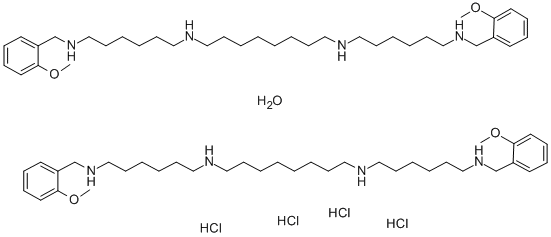Methoctramine is a muscarinic M2 receptor antagonist.
Methoctramine hydrate has been used:
- As a muscarinic receptor 2 antogonist.
- As a test molecule to check its effect on premature osteogenic differentiation of HGPS (Hutchinson-Gilford progeria syndrome) iPS (induced pluripotent)-derived mesenchymal stem cells.
ChEBI: A hydrochloride obtained by combining methoctramine with four molar equivalents of hydrochloric acid.
Methoctramine (N, N′-bis [6-[[(2-methoxyphenyl)-methyl] hexyl]-1, 8-octane] diamine) is a derivative of polymethylene tetramine.
Methoctramine is a selective M2 muscarinic receptor antagonist at nM concentrations. At mM concentrations, methoctramine directly inhibits the high affinity GTPase activity of G proteins. In oesophageal muscle, acetylcholine-mediated increase in calcium and arachidonic acid release were reduced by the M2 receptor antagonist, methoctramine. Methoctramine infused bilaterally in the dorsolateral striatum, considerably enhanced memory in cognitively impaired aged rats. Methoctramine plays a vital role in muscarinic receptor classification.
